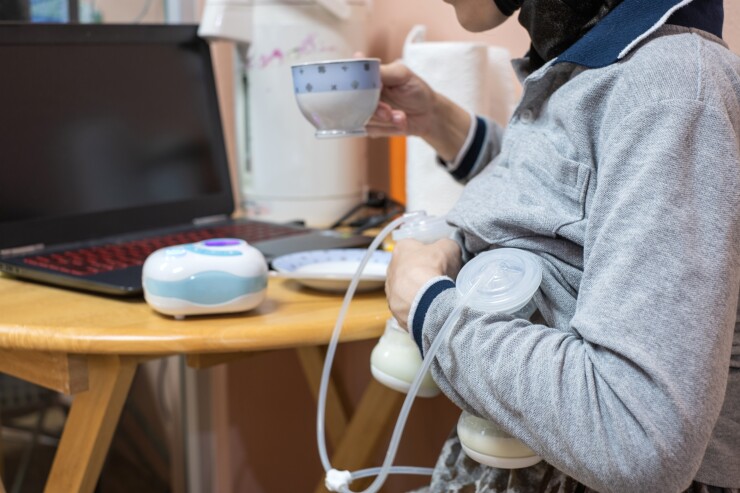Before she was even a mom herself, Abbey Donnell had heard the horror stories about breastfeeding at work. It inspired her to leave her marketing career and launch Work & Mother, which
According to the Fair Labor Standards Act, employers are legally required to provide lactation rooms for nursing employees. The quality of those rooms, however, isn't so closely regulated. Under the FLSA, the provided spaces must be private, free from intrusion, shielded from view and
"People were being told to use conference rooms, others were roaming the office trying to look for vacant rooms to pop into or using bathrooms and parked cars," Donnell says. "It just sounded so awful and I remember wondering what I was going to do, because I didn't have kids yet, but I knew I wanted them and my office then was an open floor plan with glass walls and a single unisex bathroom."
And even when an employer does provide a proper lactation room, it often lacks many of the components nursing mothers need to make the process
Read more:
Through Work & Mother, Donnell partners with both employers and landlords to create a network of functional and fully-equipped pumping suites. Donnell and her team will either
"I had been paying attention to trends in commercial real estate like shared amenities that serve entire buildings and I pitched them on the same concept for the mothers' rooms," Donnell says. "If you have a building with companies with hybrid return-to-work mandates where moms are only coming in a few days a week, the company still legally needs to provide something. A shared space amenity for the entire office could be a win-win — it would solve the legal obligations for every single employer in the building and meet the needs of mothers in a higher caliber way."
So far, Work & Mother has 10 locations with retrofitted nursing suites. Donnell recently spoke to EBN about the process of getting a state of the art lactation suite set up and why it's so i
Who do you see a greater interest from, employees or employers?
It comes from both sides. For example, one HR [team] called us because their company had a multipurpose wellness room and they had a mom who had been walked in on three times, and by the third time lawyers were involved, so they called us to come in and help provide a solution. Another time we were called by a law firm that had a single multipurpose wellness room. They had been pursuing a recruit who came in to see the office and saw that many of the female attorneys' offices had frosted glass or curtains, and when she asked about their accommodation for pumping, they didn't have a great response. Not only did they lose that recruit, but she went to a competing firm, so we were called to come in and help in that situation.
Read more:
On the other end of the issue, we got a call from an employee who found out a coworker had been going to her car in the parking garage to pump and she was livid. But as it turned out, the employee who was actually pumping didn't want to bring it up because she felt too vulnerable and nervous. It was the coworker that called us to ask if we could contact their company because they wanted it to be anonymous.
Is that why it takes employers so long to seek out solutions?
Moms aren't complainers. They're really good at just figuring out solutions and powering through it, so a lot of times what happens is you have them crouched in the closet or in a car, and it is sort of this invisible problem.
When companies do have designated lactation rooms, what's missing?
I can't tell you the number of times people have been like 'Oh! We have a room with this one recliner.' And while that may look really comfortable, reclining isn't doing moms any favors in terms of gravity and the mechanics of it all. So first of all, what you want that room setup to be is a lounge-style room that mimics a traditional wellness room or nursery setup. The majority of ours are actually set up more like a mini office for pumping, because that's more efficient and comfortable. Plus, if you're eating lunch while you pump or multitasking, then it's a better setup.
There's also all the equipment and supplies mothers need. There are so many times pumping moms have to leave during the work day to get things like membranes or because there's something that they forgot or isn't working. You can't just put off pumping — that leads to engorgement or mastitis — and so having the basics and backups on site really reduces missed work.
The final piece is cleaning and sanitizing supplies. We recommend plumbing and running water in every room, and if that's not possible within the suite we have quick-clean supplies and sanitizing supplies available because a lot of incidents of harassment actually occur when moms are taking their pumping parts into the community breakroom to wash them there. By eliminating that piece of it, you're not only making everyone more comfortable providing convenience, you're also mitigating risk.
Why is it so important for employers to think about lactation rooms as an investment?
There are many statistics on how most women plan to return to work after becoming mothers, but it still leads to a high turnover rate. That alone is a symbol that the workplace isn't set up to receive them back — there isn't the right support framework in place. At the same time, you also see physicians recommending you breastfeed exclusively for the first six months and supplementally up to two years. It can feel impossible to succeed at both being a mom and being an employee, but if you offer the proper support and facilities, it is possible to succeed in both roles.






